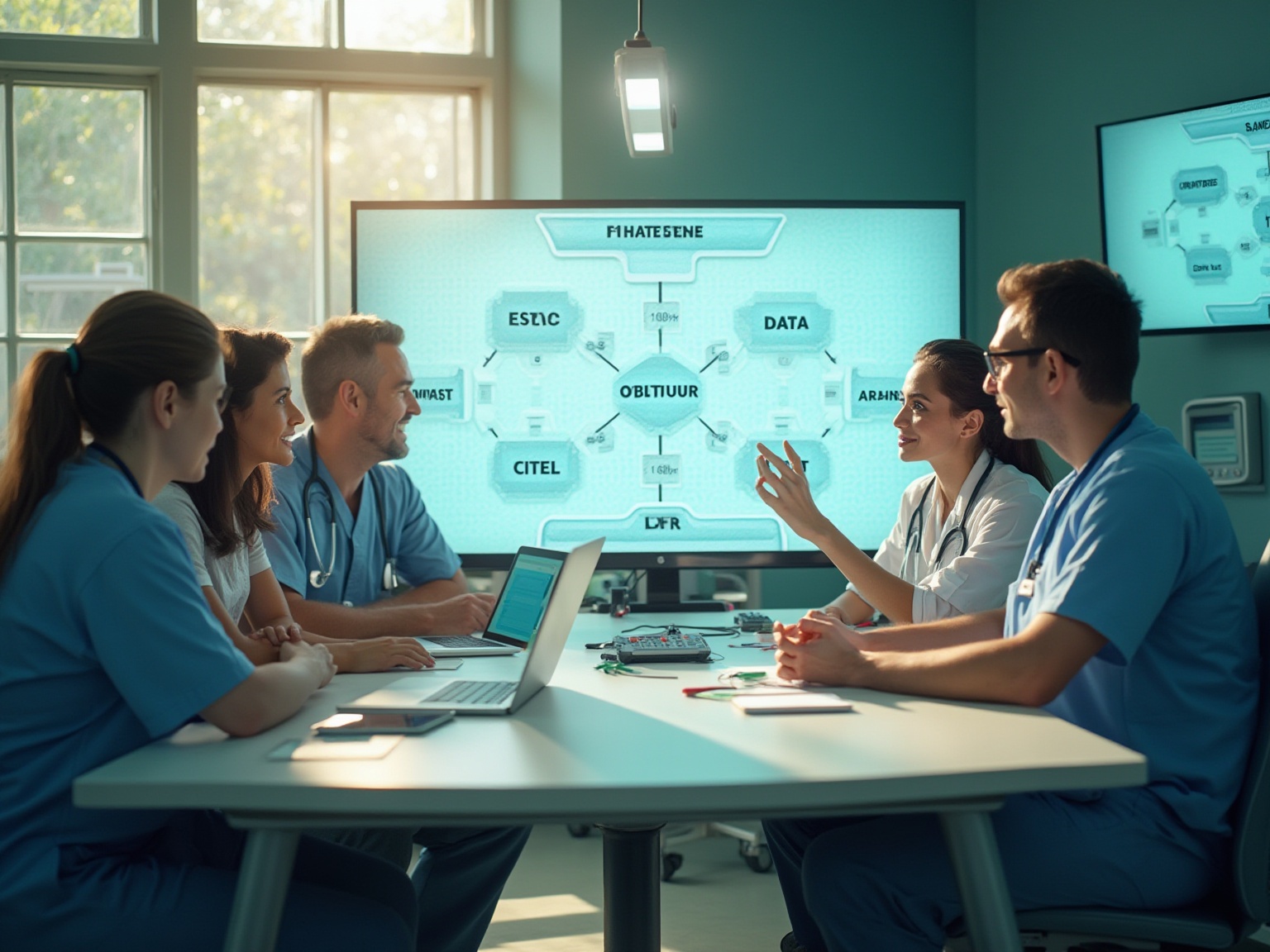Overview
This article addresses the critical issue of healthcare integration, underscoring the necessity of implementing proven strategies to significantly enhance patient care and operational efficiency. To illustrate this, it outlines essential practices such as:
- Conducting thorough assessments
- Investing in interoperable technologies
- Engaging stakeholders
These practices are indispensable for overcoming prevalent challenges like information silos and ensuring compliance within a rapidly evolving healthcare landscape.
Furthermore, adopting these strategies not only addresses immediate concerns but also positions healthcare organizations for future success. By prioritizing integration, stakeholders can create a more cohesive environment that ultimately benefits patient outcomes. Are you ready to transform your approach to healthcare integration? Embrace these best practices to navigate the complexities of today’s healthcare environment effectively.
Introduction
In the rapidly evolving landscape of healthcare, integration emerges as a cornerstone for enhancing patient care and operational efficiency. As organizations strive to harmonize diverse systems and data sources, the necessity for effective strategies becomes paramount.
This article delves into the multifaceted realm of healthcare integration, exploring its significance in:
- Improving patient outcomes
- Streamlining workflows
- Fostering collaboration among healthcare providers
By examining current trends, best practices, and innovative technologies, it becomes evident that a robust integration framework is not merely beneficial but essential for navigating the complexities of modern healthcare delivery.
With insights from industry experts and real-world examples, this exploration underscores the transformative potential of integration in shaping the future of healthcare.
Are you ready to embrace the changes that integration can bring?
Understanding Healthcare Integration: A Foundation for Success
The integration of various medical systems and information sources aims to create a cohesive and efficient medical delivery model. This combination is essential for enhancing healthcare integration, improving outcomes for individuals, optimizing operational efficiency, and ensuring that providers have access to comprehensive information about clients. By acknowledging the different forms of unification—such as data, process, and system unification—medical organizations can effectively plan their initiatives to tackle the unique challenges within the field.
Current statistics underscore the critical importance of medical unification, revealing that individuals with a maximum degree of morbidity receive an additional four hours of care weekly. This highlights the necessity for efficient unification strategies to manage complex client requirements. Avato’s dedicated hybrid unification platform addresses these needs by enhancing operational capabilities while lowering expenses. The integration of healthcare not only fosters teamwork among medical providers but also results in improved care coordination and increased satisfaction for individuals receiving care.
For instance, the assessment of combined care models in Catalonia, particularly the Salut+Social initiative, illustrates the efficacy of these methods. This research found that integration healthcare models significantly enhance satisfaction, improve perceived quality of care, and facilitate better access to health and social services. These findings underscore the necessity for ongoing assessments of combined care implementations to identify the most effective models—a process that Avato can facilitate through its robust integration healthcare solutions.
Expert opinions further reinforce the importance of medical system coordination. Jinnan Zhang from the School of Public Policy and Administration at Xi’an Jiaotong University emphasizes the need for integration healthcare by ensuring seamless sharing of patient medical records among community health centers, highlighting the unacceptable nature of fragmented information access. Avato’s hybrid unification platform directly addresses this challenge by offering a dependable and secure method for integration healthcare, ensuring that medical providers have access to the information they require when they need it.
Furthermore, Avato’s platform provides real-time oversight and notifications regarding system performance, further enhancing operational efficiency.
As we approach 2025, optimal methods in integration healthcare will continue to evolve, concentrating on maximizing operational capabilities while lowering expenses. The combination of systems not only offers a future-proof technology stack but also improves the overall quality of care provided to individuals. By emphasizing these integration healthcare strategies, medical organizations can significantly enhance client outcomes and sustain a competitive advantage in the rapidly evolving medical environment, leveraging Avato’s groundbreaking solutions.
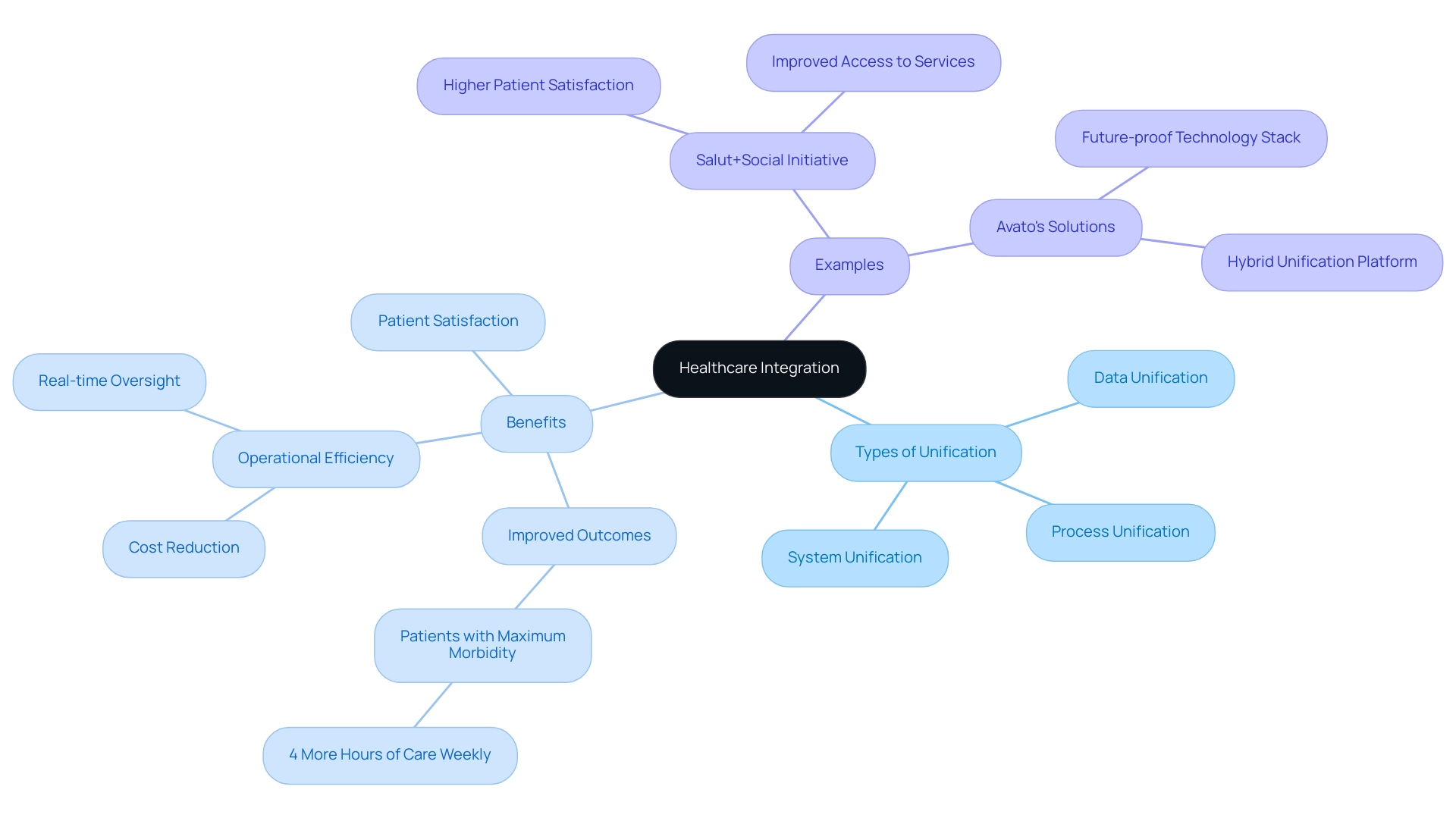
The Importance of Data Integration in Healthcare Systems
Data unification in medical systems is not just important; it is essential for consolidating information from various sources, including electronic health records (EHRs), laboratory systems, and billing platforms. This thorough combination empowers medical professionals to obtain a complete perspective of patient information, which is crucial for offering tailored care. By utilizing combined information, medical organizations can identify trends, enhance care coordination, and significantly improve operational efficiency.
Furthermore, efficient information unification promotes interoperability, allowing seamless communication among different systems—an essential aspect of contemporary medical service delivery. As the healthcare environment evolves, organizations must prioritize information unification strategies that ensure accuracy and security while complying with stringent regulations such as HIPAA.
Recent statistics indicate that direct communication to databases remains low at 10%, while more flexible messaging approaches have emerged at 12% during the 2003–2005 period. This highlights the ongoing need for enhanced unification methods. Looking ahead to 2025, the influence of information unification on healthcare is anticipated to be significant, with organizations leveraging unified systems to improve outcomes and simplify operations.
Successful instances of electronic health records incorporation showcase the potential for enhanced healthcare and operational efficiency. For example, organizations that have established strong information unification frameworks report substantial improvements in care delivery and patient satisfaction. Gustavo Estrada from BC Provincial Health Services Authority remarked, “Avato has streamlined intricate projects and achieved outcomes within expected timelines and financial limits,” illustrating a practical instance of successful information consolidation.
As the Asia Pacific area anticipates rapid growth in medical IT solutions, fueled by investments in medical infrastructure and digital health technologies, the significance of efficient information unification strategies will continue to rise. North America currently leads the Medical IT Connectedness Market due to elevated adoption rates of advanced medical technologies and strict regulatory standards, underscoring the essential demand for reliable connection solutions.
In summary, the integration of information within medical systems is not merely a technical necessity; it is a strategic imperative that enhances patient care, operational efficiency, and adherence to regulatory standards. Avato’s hybrid platform plays a crucial role in this landscape, ensuring 24/7 uptime for critical connections and empowering healthcare organizations to maximize the value of their legacy systems while simplifying complex connections. The platform’s ability to manage intricate connections effortlessly, along with its focus on accuracy and security, establishes it as a vital resource for banking IT managers aiming to enhance their operations and connectivity skills.
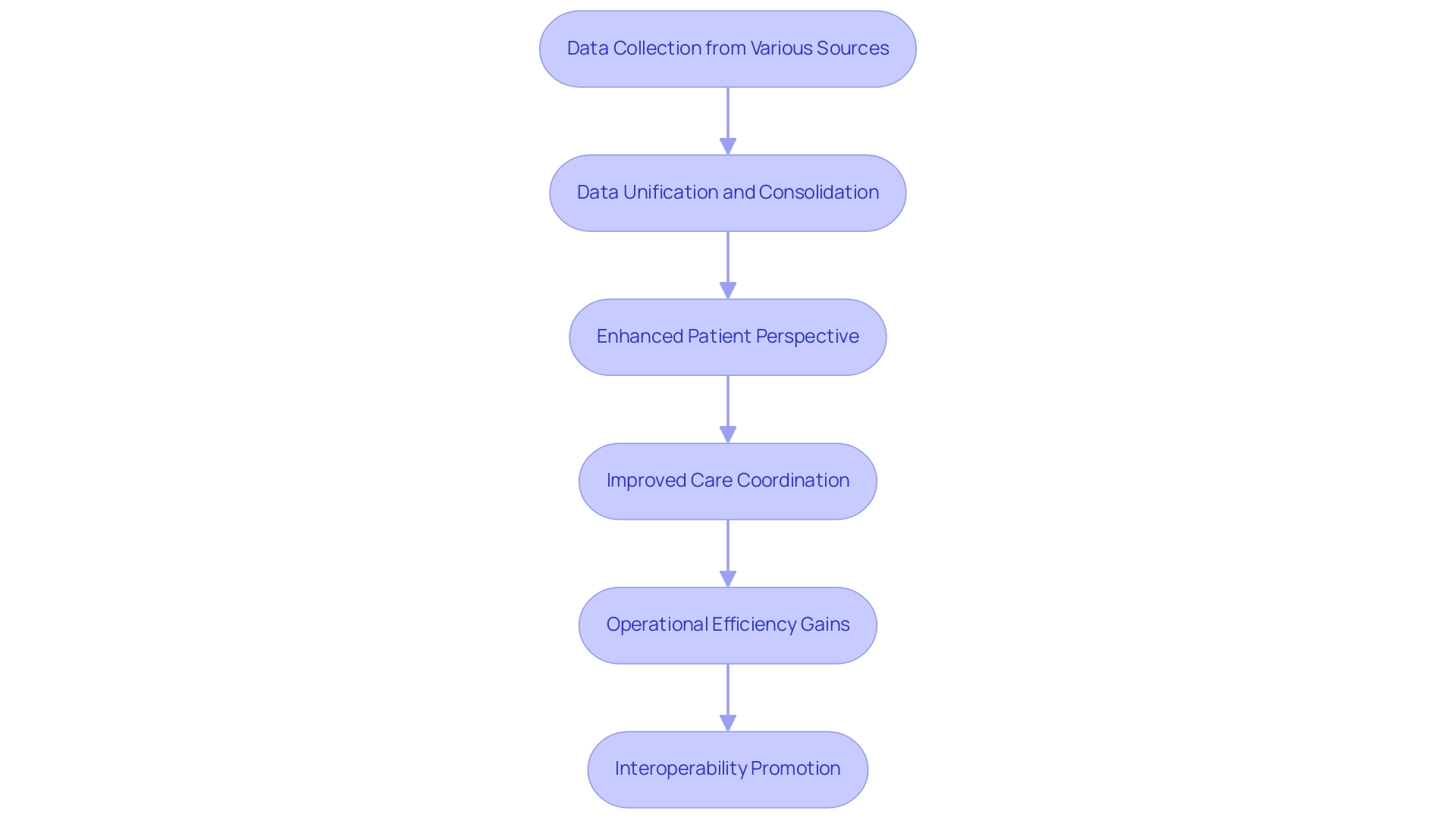
Overcoming Common Challenges in Healthcare Integration
The challenges of integrating healthcare systems encompass information silos, interoperability issues, and compliance concerns. Data silos arise when information is confined within separate systems, obstructing providers’ access to a comprehensive view of individual data. This fragmentation can lead to adverse outcomes; a staggering 85 percent of surveyed physicians reported that uncoordinated care results in one or more negative consequences for individuals.
Interoperability challenges further complicate the landscape, as different systems often struggle to communicate effectively. This lack of seamless integration can result in disjointed care, where essential patient information is not readily accessible to medical professionals when needed. Moreover, organizations must navigate a labyrinth of regulatory requirements to ensure compliance while integrating their systems, adding another layer of complexity.
To effectively tackle these challenges, healthcare organizations should adopt a strategic approach that encompasses several key strategies:
- Stakeholder Engagement: Involving all relevant parties, including healthcare providers, IT staff, and administrative personnel, is crucial for identifying integration needs and fostering collaboration. As Don Berwick aptly stated, “You can’t just say the environment won’t let you do it. You just can’t. It’s passing the buck a step beyond what a proud set of professionals ought to be doing.”
- Investment in Interoperable Technologies: Embracing technologies designed for interoperability can significantly reduce the barriers posed by information silos. For instance, platforms like Copper enable real-time connections of master data, enhancing the ability to share critical information across systems. Furthermore, Avato’s hybrid unification platform is crafted to expedite secure system connections, offering a dependable and future-ready technology stack that allows medical organizations to adapt to evolving needs while ensuring compliance and security. Distinct features of Avato’s platform, including its support for 12 levels of interface maturity, empower organizations to balance the speed of integration with the sophistication necessary to future-proof their technology stack.
- Ongoing Training: Regular training for staff on best practices for merging systems ensures that all team members are equipped to manage the complexities of the medical field effectively.
A case study titled “Cultural Competence in Health Care” highlights the disparities in medical quality experienced by racial and ethnic minorities, underscoring the necessity for culturally sensitive care. This study advocates for educational reforms to equip health professionals to address these disparities, demonstrating the broader implications of effective integration. By acknowledging the significance of cultural competence, medical organizations can more effectively tailor their approaches to meet diverse individual requirements.
Avato’s hybrid integration platform can support culturally sensitive care by ensuring that critical data is integrated and accessible, allowing for more informed and personalized care decisions.
As the medical landscape evolves in 2025, organizations must remain vigilant in overcoming interoperability issues. Expert insights emphasize that addressing these challenges is not merely a technical endeavor; it is a commitment to improving patient care and outcomes. By applying these strategies and leveraging Avato’s capabilities, medical organizations can navigate the complexities of integrated healthcare, ultimately resulting in a more connected and efficient medical system.
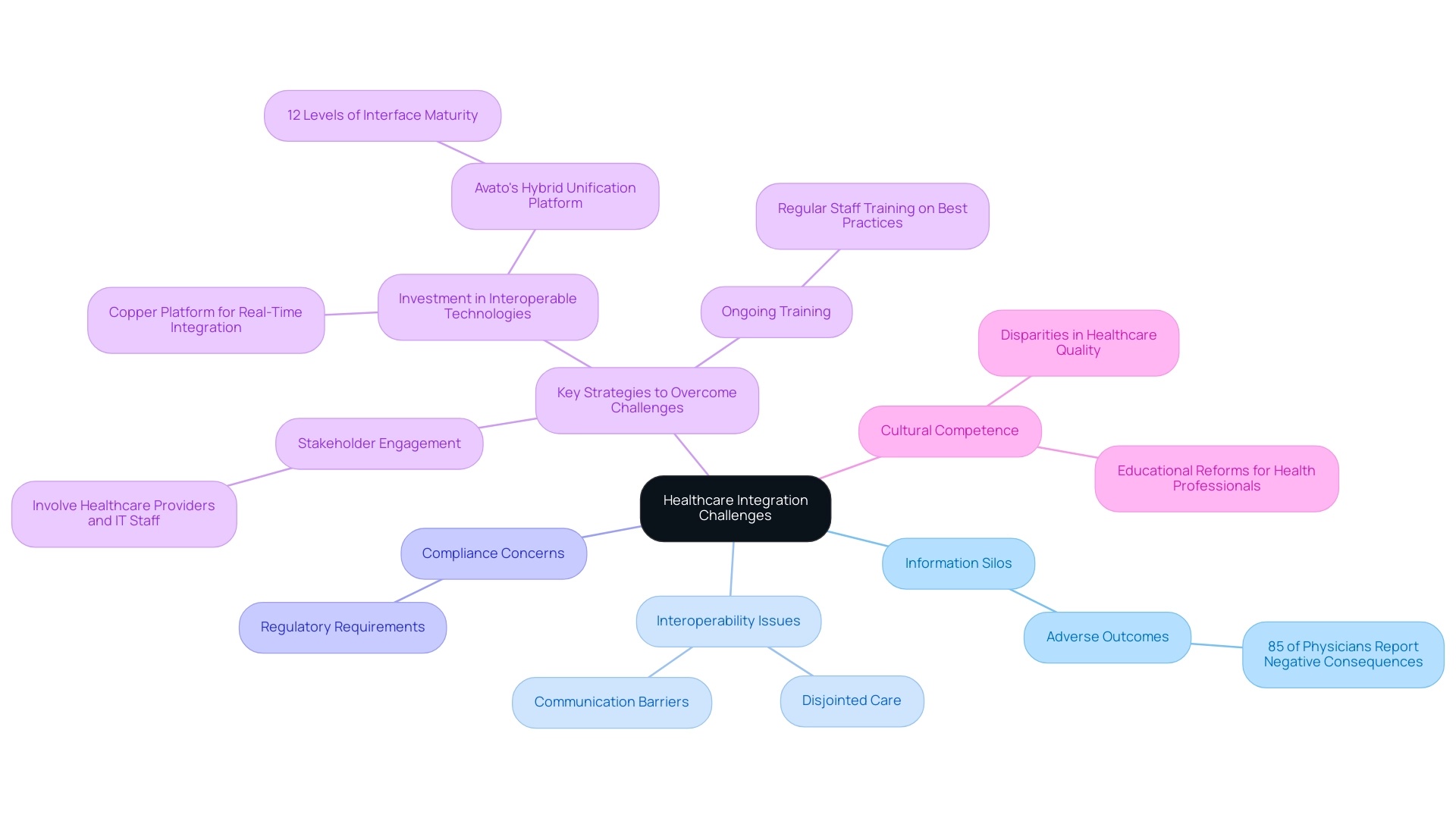
Best Practices for Effective Healthcare Integration
To achieve effective healthcare integration, organizations must adopt best practices that ensure success.
- Conduct a Thorough Assessment: Begin by evaluating existing systems and workflows to identify specific connection needs. This foundational step guarantees that the integration strategy is tailored to the unique challenges and requirements of the organization.
- Invest in Interoperable Technologies: Choosing technologies that enable smooth information exchange is essential. Interoperability not only enhances communication between disparate systems but also facilitates compliance with regulations such as HIPAA, which mandate the protection of patient data while ensuring accessibility for healthcare professionals. Avato’s hybrid connection platform is designed to support these interoperability needs, enabling organizations to meet regulatory requirements effectively.
- Engage Stakeholders Across Departments: Successful incorporation initiatives require the involvement of various stakeholders, including IT, clinical staff, and administrative personnel. Their insights and support are essential for aligning goals and promoting a collaborative atmosphere that encourages unification efforts. As Gustavo Estrada from BC Provincial Health Services Authority noted, “Avato has simplified complex projects and delivered results within desired time frames and budget constraints,” highlighting the importance of stakeholder engagement in achieving successful integration.
- Implement Robust Information Governance Policies: Establishing strong information governance is essential for maintaining quality and security. This includes defining ownership, ensuring compliance with regulations, and implementing protocols for access and sharing. Given that healthcare data breaches have affected over 112 million individuals, the need for robust data governance policies cannot be overstated.
- Provide Ongoing Training for Staff: Continuous education and training for staff members are necessary to ensure they can effectively utilize integrated systems. Investing in comprehensive training programs and implementing change management strategies will empower employees with the knowledge and skills to navigate new technologies, enhancing overall operational efficiency and care. This approach fosters a culture of innovation within the organization, ensuring a smooth transition to the new platform. Additionally, utilizing Avato’s hybrid connection platform can help future-proof systems by allowing for the incorporation of new tools with existing assets, ensuring long-term adaptability.
By following these best practices, medical organizations can greatly enhance their efforts in integrating healthcare, resulting in better patient care and operational efficiency. The success rates of organizations implementing these strategies demonstrate their effectiveness, with many reporting improved workflows and reduced costs. For example, case studies have shown that organizations employing mixture models for medical resource utilization have attained improved results by adapting to complex data distributions, thus enhancing their unification capabilities.
As industry specialists highlight, stakeholder involvement is essential; it not only promotes a culture of teamwork but also propels the success of collaborative initiatives across the medical field.
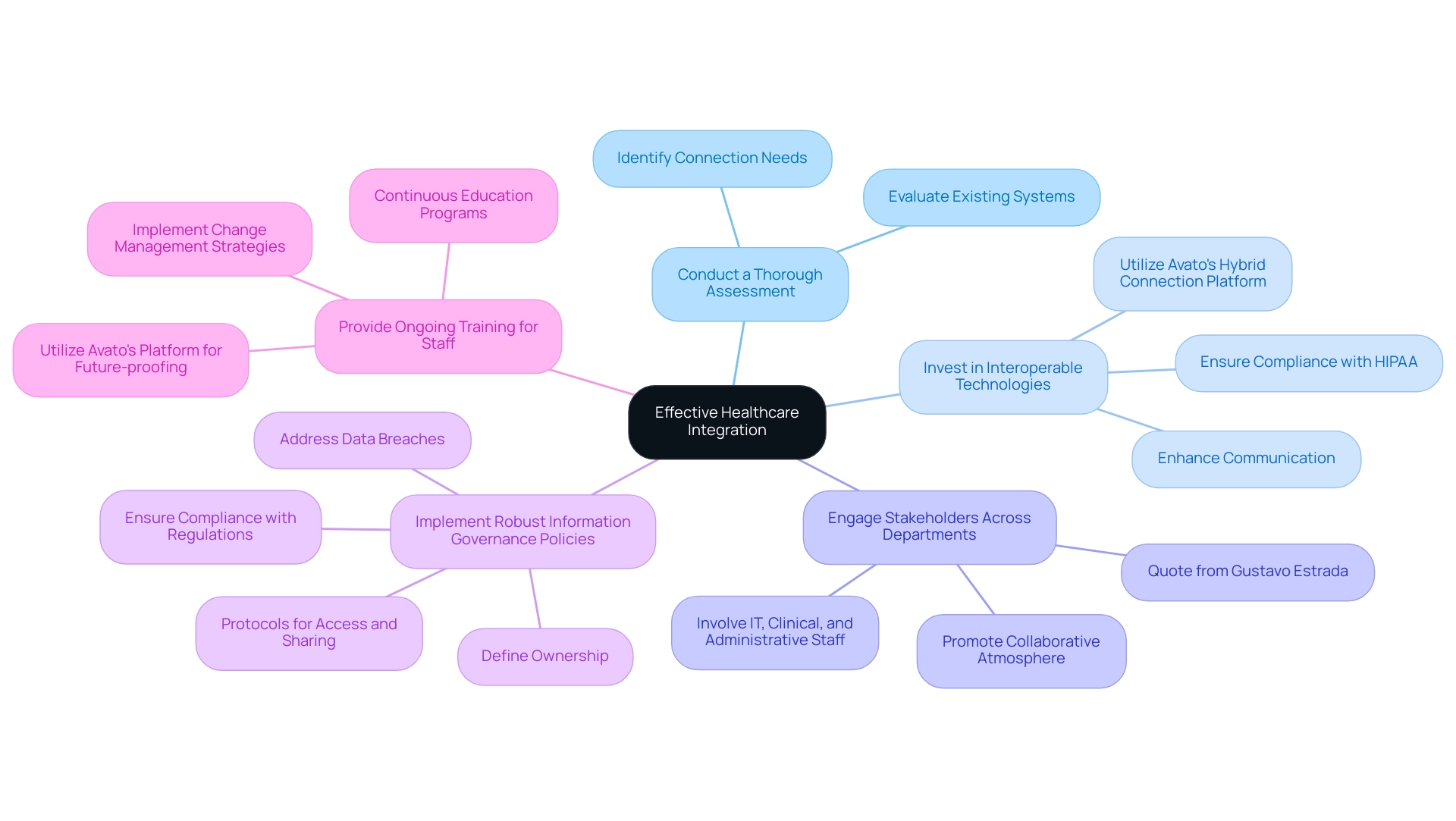
Leveraging Technology for Seamless Healthcare Integration
Technology is crucial for achieving seamless integration in healthcare services, and hybrid connection platforms, such as those created by Avato, are at the forefront of this transformation. Avato’s hybrid connectivity platform empowers medical organizations with essential tools for healthcare integration, enabling them to connect disparate systems and facilitate real-time information exchange, a vital component for enhancing patient care and operational efficiency.
Avato’s platform supports a diverse range of connection methods, including APIs, middleware, and transformation tools. This flexibility allows medical organizations to customize their integration strategies to meet specific operational needs. By leveraging these technologies, organizations can significantly reduce connection timelines, enhance data accuracy, and streamline workflows, ultimately leading to improved patient outcomes through effective healthcare integration.
Furthermore, Avato’s platform substantially lowers costs associated with healthcare system integration, making it an invaluable resource for medical organizations.
The adoption of cloud-based solutions further boosts collaboration efforts through healthcare integration by providing scalable and flexible infrastructure. This is particularly crucial as healthcare organizations increasingly depend on autonomous systems, such as ventilators that continuously monitor patient responses, to enhance remote healthcare capabilities. The incorporation of such technologies is anticipated to revolutionize patient monitoring and management.
As noted by Gustavo Estrada, a customer, “Avato has the capacity to simplify intricate projects and deliver outcomes within expected timelines and financial constraints,” underscoring the effectiveness of Avato’s hybrid connection platform in navigating these complexities.
Recent trends indicate that AI is playing a pivotal role in the unification of medical systems, with its ability to analyze supply chains, minimize waste, and enhance facility management. However, this also raises concerns about the environmental impact of digital solutions, highlighting the need for a balanced approach to technology adoption.
Case studies emphasize the importance of usability and accessibility in smart connected health systems (SCH). For instance, improving the design of these systems and providing adequate training can significantly enhance user engagement and effectiveness. Proper training and design are essential to ensure that SCH systems are accessible and user-friendly, thereby maximizing their efficacy in medical settings.
Statistics reveal a growing trend in the adoption of hybrid connection platforms within the medical sector, reflecting their critical role in modernizing health IT infrastructures. For example, autonomous ventilators can consistently monitor a patient’s reaction to ventilation, showcasing the advancements in medical technology that platforms like Avato facilitate. As organizations continue to embrace these technologies, the emphasis on seamless data exchange will remain vital for healthcare integration, ensuring that providers can deliver high-quality care in an increasingly interconnected world.
Moreover, Avato’s strategic alliance with Red Hat enhances its hybrid unification offerings, providing enterprise open-source solutions that further empower medical organizations.
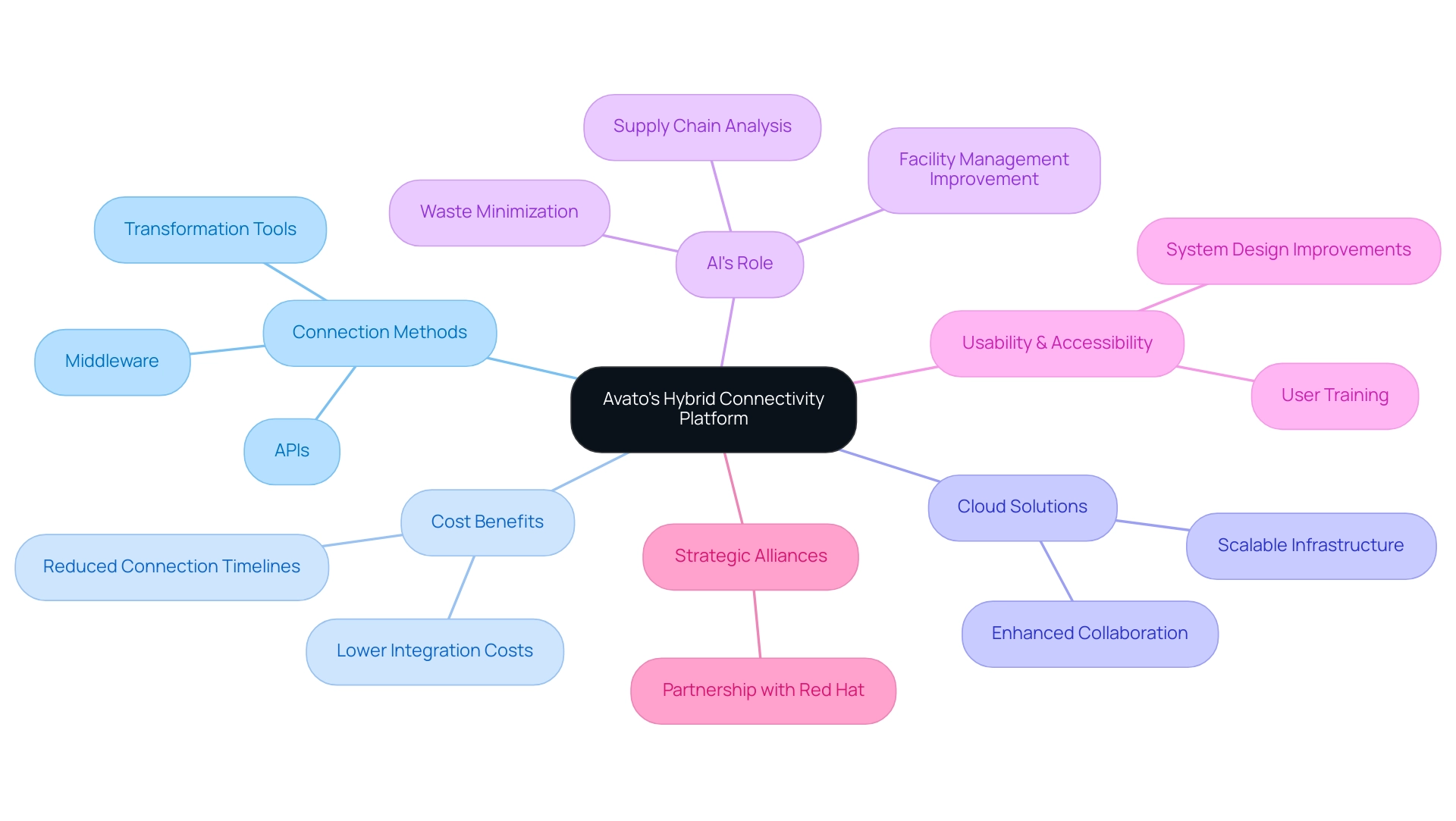
Ensuring Compliance and Security in Healthcare Integration
Compliance and security are paramount in medical integration, particularly given the increasing scrutiny surrounding HIPAA regulations. As we approach 2025, organizations must navigate a landscape characterized by a surge in HIPAA audits and investigations, with 220 audits and over 9,136 investigations initiated in 2020 alone. This trend underscores the essential need for medical entities to establish robust security measures to safeguard individual information and ensure privacy.
To protect sensitive details, medical organizations should embrace comprehensive security protocols, including:
- Information encryption
- Strict access controls
- Regular security evaluations
These measures are crucial, especially considering that breaches involving business associates in 2023 exposed over 93 million records, highlighting the significant risks associated with partnerships in the healthcare sector. Establishing clear policies and procedures for information handling and sharing is equally essential for maintaining compliance and protecting individual information.
Furthermore, cultivating a culture of security within the organization is vital. How can organizations achieve this? By educating personnel on compliance necessities and security best practices, ensuring that everyone understands their role in protecting client information. As Gustavo Estrada, a customer, noted, Avato simplifies complex projects and delivers results within desired time frames and budget constraints, which can be instrumental in achieving compliance and security goals.
Avato’s skilled services in healthcare integration guarantee seamless information and systems amalgamation, offering 24/7 availability for essential connections, further assisting medical organizations in their compliance initiatives.
Avato focuses on integrating various medical systems, employing approaches that simplify the unification process while addressing compliance and security issues. By utilizing Avato’s hybrid integration platform for healthcare, medical organizations can effectively link diverse systems, ensuring that individual information is managed securely and in accordance with regulatory standards.
In addition to these actions, medical organizations should remain vigilant regarding current security trends and compliance obligations. For instance, as of 2025, only 47% of professionals use portals to communicate information about individuals, while a concerning 7% still rely on unencrypted emails. This statistic emphasizes the urgent need for medical providers to adopt secure communication methods to protect patient information effectively.
By prioritizing compliance and security, medical organizations can mitigate the risks associated with data breaches, maintain patient trust, and ensure they meet the evolving demands of regulatory frameworks. The substantial rise in HIPAA audits and investigations further highlights the necessity for rigorous oversight and security measures in partnerships—a necessity that Avato is committed to addressing through its innovative hybrid solutions.
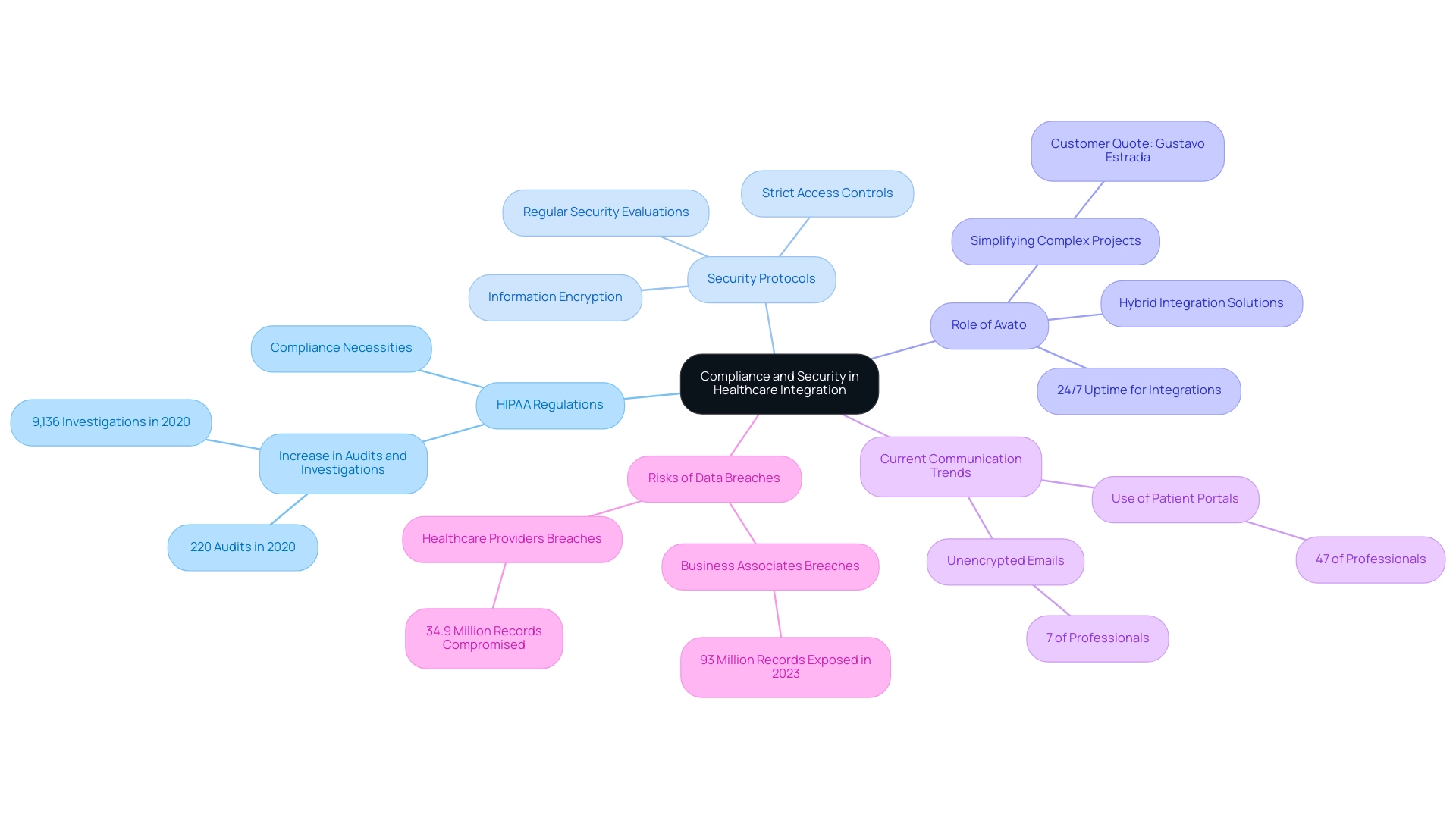
The Future of Healthcare Integration: Trends and Innovations
The future of medical system collaboration stands on the brink of transformative advancements, primarily fueled by emerging technologies and innovative trends. Arvato, with its dedicated hybrid integration platform, is at the forefront of this evolution in healthcare integration, simplifying the connection of disparate systems and enhancing business value for organizations in the medical field. Our platform specifically tackles challenges such as interoperability and information security, ensuring that service providers can seamlessly connect their systems and unlock isolated assets.
Artificial intelligence (AI) and machine learning are set to play pivotal roles in enhancing analysis and decision-making processes, enabling medical organizations to extract actionable insights from vast amounts of information. For instance, AI algorithms can analyze social media data to predict disease outbreaks, thereby informing public health strategies and improving response times.
Simultaneously, the Internet of Things (IoT) is revolutionizing care for individuals through real-time monitoring and data collection. IoT devices empower healthcare providers to continuously track individual health metrics, facilitating timely interventions and personalized care plans. However, as highlighted in a recent survey on Sensor-IoT-AI-Blockchain-based Health Management Systems, challenges such as user acceptance, data security, and interoperability remain critical obstacles that must be addressed to maximize the effectiveness of these technologies.
Looking toward 2025, the demand for interoperability and standardized data formats will persist in shaping healthcare integration strategies, promoting seamless communication between disparate systems. Healthcare organizations must stay agile and proactive in embracing these trends to enhance their integration efforts and ultimately improve patient care. As industry specialists emphasize, the incorporation of AI and IoT technologies is not merely a trend but a necessity for medical service providers aiming to remain competitive in an increasingly complex environment.
Moreover, the regulatory landscape presents additional challenges, with 30% of participants in a Deloitte survey identifying regulatory issues alongside implementation difficulties as key barriers to technology investment. This underscores the importance of establishing robust unification frameworks for healthcare integration, such as those offered by Arvato, which not only comply with regulations but also foster innovative solutions. Our team of unification specialists is dedicated to designing the technological foundations necessary to enable rich, connected customer experiences, delivering tangible results for our clients.
In summary, the integration healthcare landscape is evolving rapidly, driven by AI, IoT, and a commitment to interoperability. Entities that embrace these changes, particularly through Arvato’s hybrid unification platform, will be better equipped to navigate the complexities of modern medical service delivery and enhance patient outcomes. The breadth of research supporting these assertions is evident, with 189 articles selected after thorough review and assessments, highlighting the crucial role of these emerging technologies in shaping the future of healthcare integration.
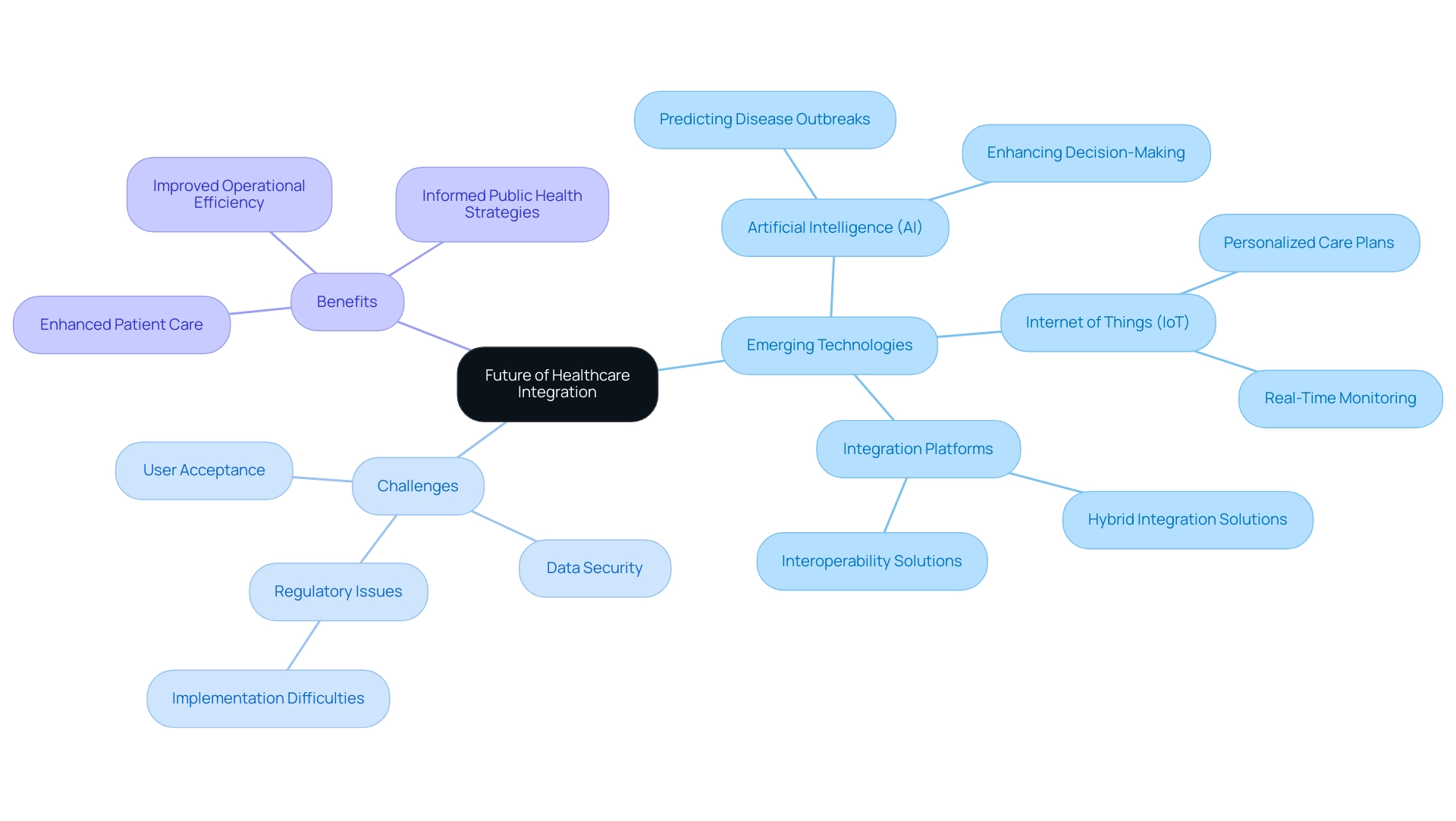
Conclusion
Investing in healthcare integration is no longer merely a strategic choice; it has become a necessity for organizations seeking to enhance patient care and operational efficiency. The significance of integration is paramount, as it not only improves patient outcomes but also streamlines workflows and fosters collaboration among healthcare providers. By harmonizing diverse systems and data sources, healthcare organizations can effectively overcome the challenges posed by data silos and interoperability issues, ultimately leading to more coordinated and comprehensive care.
Current trends, best practices, and innovative technologies illustrate that a robust integration framework is essential for navigating the complexities of modern healthcare delivery. Effective data integration facilitates seamless communication across various platforms and ensures compliance with regulatory standards, enhancing the overall security and reliability of patient information. Moreover, embracing advanced technologies, such as AI and IoT, positions organizations to leverage data more effectively, driving informed decision-making and improving patient monitoring.
Looking to the future, a commitment to enhancing healthcare integration will be pivotal in shaping the landscape of healthcare delivery. Organizations that prioritize these strategies, particularly through innovative solutions like Avato’s hybrid integration platform, will be well-equipped to meet the evolving demands of the industry. By embracing integration, healthcare providers can significantly improve patient experiences and outcomes, ensuring they remain competitive in an increasingly interconnected and technologically advanced environment. The time to act is now; the future of healthcare integration is bright, and the potential for transformative change is within reach.

